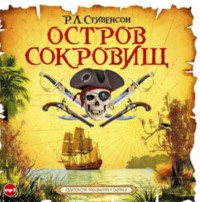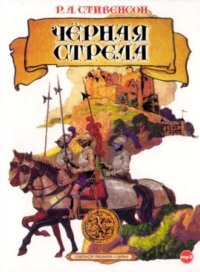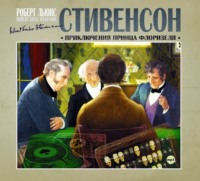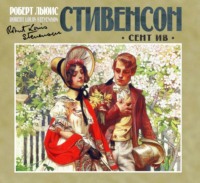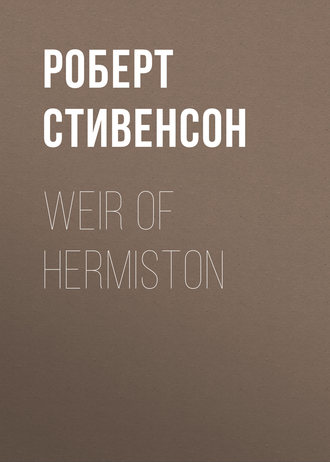 полная версия
полная версияWeir of Hermiston
Her father Gilbert had been deeply pious, a savage disciplinarian in the antique style, and withal a notorious smuggler. “I mind when I was a bairn getting mony a skelp and being shoo’d to bed like pou’try,” she would say. “That would be when the lads and their bit kegs were on the road. We’ve had the riffraff of two-three counties in our kitchen, mony’s the time, betwix’ the twelve and the three; and their lanterns would be standing in the forecourt, ay, a score o’ them at once. But there was nae ungodly talk permitted at Cauldstaneslap. My faither was a consistent man in walk and conversation; just let slip an aith, and there was the door to ye! He had that zeal for the Lord, it was a fair wonder to hear him pray, but the family has aye had a gift that way.” This father was twice married, once to a dark woman of the old Ellwald stock, by whom he had Gilbert, presently of Cauldstaneslap; and, secondly, to the mother of Kirstie. “He was an auld man when he married her, a fell auld man wi’ a muckle voice – you could hear him rowting from the top o’ the Kye-skairs,” she said; “but for her, it appears she was a perfit wonder. It was gentle blood she had, Mr. Archie, for it was your ain. The country-side gaed gyte about her and her gowden hair. Mines is no to be mentioned wi’ it, and there’s few weemen has mair hair than what I have, or yet a bonnier colour. Often would I tell my dear Miss Jeannie – that was your mother, dear, she was cruel ta’en up about her hair, it was unco’ tender, ye see – ‘Houts, Miss Jeannie,’ I would say, ‘just fling your washes and your French dentifrishes in the back o’ the fire, for that’s the place for them; and awa’ down to a burn side, and wash yersel’ in cauld hill water, and dry your bonny hair in the caller wind o’ the muirs, the way that my mother aye washed hers, and that I have aye made it a practice to have wishen mines – just you do what I tell ye, my dear, and ye’ll give me news of it! Ye’ll have hair, and routh of hair, a pigtail as thick’s my arm,’ I said, ‘and the bonniest colour like the clear gowden guineas, so as the lads in kirk’ll no can keep their eyes off it!’ Weel, it lasted out her time, puir thing! I cuttit a lock of it upon her corp that was lying there sae cauld. I’ll show it ye some of thir days if ye’re good. But, as I was sayin’, my mither – ”
On the death of the father there remained golden-haired Kirstie, who took service with her distant kinsfolk, the Rutherfords, and black-a-vised Gilbert, twenty years older, who farmed the Cauldstaneslap, married, and begot four sons between 1773 and 1784, and a daughter, like a postscript, in ’97, the year of Camperdown and Cape St. Vincent. It seemed it was a tradition in the family to wind up with a belated girl. In 1804, at the age of sixty, Gilbert met an end that might be called heroic. He was due home from market any time from eight at night till five in the morning, and in any condition from the quarrelsome to the speechless, for he maintained to that age the goodly customs of the Scots farmer. It was known on this occasion that he had a good bit of money to bring home; the word had gone round loosely. The laird had shown his guineas, and if anybody had but noticed it, there was an ill-looking, vagabond crew, the scum of Edinburgh, that drew out of the market long ere it was dusk and took the hill-road by Hermiston, where it was not to be believed that they had lawful business. One of the country-side, one Dickieson, they took with them to be their guide, and dear he paid for it! Of a sudden in the ford of the Broken Dykes, this vermin clan fell on the laird, six to one, and him three parts asleep, having drunk hard. But it is ill to catch an Elliott. For a while, in the night and the black water that was deep as to his saddle-girths, he wrought with his staff like a smith at his stithy, and great was the sound of oaths and blows. With that the ambuscade was burst, and he rode for home with a pistol-ball in him, three knife wounds, the loss of his front teeth, a broken rib and bridle, and a dying horse. That was a race with death that the laird rode! In the mirk night, with his broken bridle and his head swimming, he dug his spurs to the rowels in the horse’s side, and the horse, that was even worse off than himself, the poor creature! screamed out loud like a person as he went, so that the hills echoed with it, and the folks at Cauldstaneslap got to their feet about the table and looked at each other with white faces. The horse fell dead at the yard gate, the laird won the length of the house and fell there on the threshold. To the son that raised him he gave the bag of money. “Hae,” said he. All the way up the thieves had seemed to him to be at his heels, but now the hallucination left him – he saw them again in the place of the ambuscade – and the thirst of vengeance seized on his dying mind. Raising himself and pointing with an imperious finger into the black night from which he had come, he uttered the single command, “Brocken Dykes,” and fainted. He had never been loved, but he had been feared in honour. At that sight, at that word, gasped out at them from a toothless and bleeding mouth, the old Elliott spirit awoke with a shout in the four sons. “Wanting the hat,” continues my author, Kirstie, whom I but haltingly follow, for she told this tale like one inspired, “wanting guns, for there wasna twa grains o’ pouder in the house, wi’ nae mair weepons than their sticks into their hands, the fower o’ them took the road. Only Hob, and that was the eldest, hunkered at the doorsill where the blood had rin, fyled his hand wi’ it – and haddit it up to Heeven in the way o’ the auld Border aith. ‘Hell shall have her ain again this nicht!’ he raired, and rode forth upon his earrand.” It was three miles to Broken Dykes, down hill, and a sore road. Kirstie has seen men from Edinburgh dismounting there in plain day to lead their horses. But the four brothers rode it as if Auld Hornie were behind and Heaven in front. Come to the ford, and there was Dickieson. By all tales, he was not dead, but breathed and reared upon his elbow, and cried out to them for help. It was at a graceless face that he asked mercy. As soon as Hob saw, by the glint of the lantern, the eyes shining and the whiteness of the teeth in the man’s face, “Damn you!” says he; “ye hae your teeth, hae ye?” and rode his horse to and fro upon that human remnant. Beyond that, Dandie must dismount with the lantern to be their guide; he was the youngest son, scarce twenty at the time. “A’ nicht long they gaed in the wet heath and jennipers, and whaur they gaed they neither knew nor cared, but just followed the bluid stains and the footprints o’ their faither’s murderers. And a’ nicht Dandie had his nose to the grund like a tyke, and the ithers followed and spak’ naething, neither black nor white. There was nae noise to be heard, but just the sough of the swalled burns, and Hob, the dour yin, risping his teeth as he gaed.” With the first glint of the morning they saw they were on the drove road, and at that the four stopped and had a dram to their breakfasts, for they knew that Dand must have guided them right, and the rogues could be but little ahead, hot foot for Edinburgh by the way of the Pentland Hills. By eight o’clock they had word of them – a shepherd had seen four men “uncoly mishandled” go by in the last hour. “That’s yin a piece,” says Clem, and swung his cudgel. “Five o’ them!” says Hob. “God’s death, but the faither was a man! And him drunk!” And then there befell them what my author termed “a sair misbegowk,” for they were overtaken by a posse of mounted neighbours come to aid in the pursuit. Four sour faces looked on the reinforcement. “The Deil’s broughten you!” said Clem, and they rode thenceforward in the rear of the party with hanging heads. Before ten they had found and secured the rogues, and by three of the afternoon, as they rode up the Vennel with their prisoners, they were aware of a concourse of people bearing in their midst something that dripped. “For the boady of the saxt,” pursued Kirstie, “wi’ his head smashed like a hazelnit, had been a’ that nicht in the chairge o’ Hermiston Water, and it dunting it on the stanes, and grunding it on the shallows, and flinging the deid thing heels-ower-hurdie at the Fa’s o’ Spango; and in the first o’ the day, Tweed had got a hold o’ him and carried him off like a wind, for it was uncoly swalled, and raced wi’ him, bobbing under brae-sides, and was long playing with the creature in the drumlie lynns under the castle, and at the hinder end of all cuist him up on the starling of Crossmichael brig. Sae there they were a’thegither at last (for Dickieson had been brought in on a cart long syne), and folk could see what mainner o’man my brither had been that had held his head again sax and saved the siller, and him drunk!” Thus died of honourable injuries and in the savour of fame Gilbert Elliott of the Cauldstaneslap; but his sons had scarce less glory out of the business. Their savage haste, the skill with which Dand had found and followed the trail, the barbarity to the wounded Dickieson (which was like an open secret in the county), and the doom which it was currently supposed they had intended for the others, struck and stirred popular imagination. Some century earlier the last of the minstrels might have fashioned the last of the ballads out of that Homeric fight and chase; but the spirit was dead, or had been reincarnated already in Mr. Sheriff Scott, and the degenerate moorsmen must be content to tell the tale in prose, and to make of the “Four Black Brothers” a unit after the fashion of the “Twelve Apostles” or the “Three Musketeers.”
Robert, Gilbert, Clement, and Andrew – in the proper Border diminutives, Hob, Gib, Clem, and Dand Elliott – these ballad heroes, had much in common; in particular, their high sense of the family and the family honour; but they went diverse ways, and prospered and failed in different businesses. According to Kirstie, “they had a’ bees in their bonnets but Hob.” Hob the laird was, indeed, essentially a decent man. An elder of the Kirk, nobody had heard an oath upon his lips, save perhaps thrice or so at the sheep-washing, since the chase of his father’s murderers. The figure he had shown on that eventful night disappeared as if swallowed by a trap. He who had ecstatically dipped his hand in the red blood, he who had ridden down Dickieson, became, from that moment on, a stiff and rather graceless model of the rustic proprieties; cannily profiting by the high war prices, and yearly stowing away a little nest-egg in the bank against calamity; approved of and sometimes consulted by the greater lairds for the massive and placid sense of what he said, when he could be induced to say anything; and particularly valued by the minister, Mr. Torrance, as a right-hand man in the parish, and a model to parents. The transfiguration had been for the moment only; some Barbarossa, some old Adam of our ancestors, sleeps in all of us till the fit circumstance shall call it into action; and, for as sober as he now seemed, Hob had given once for all the measure of the devil that haunted him. He was married, and, by reason of the effulgence of that legendary night, was adored by his wife. He had a mob of little lusty, barefoot children who marched in a caravan the long miles to school, the stages of whose pilgrimage were marked by acts of spoliation and mischief, and who were qualified in the country-side as “fair pests.” But in the house, if “faither was in,” they were quiet as mice. In short, Hob moved through life in a great peace – the reward of any one who shall have killed his man, with any formidable and figurative circumstance, in the midst of a country gagged and swaddled with civilisation.
It was a current remark that the Elliotts were “guid and bad, like sanguishes”; and certainly there was a curious distinction, the men of business coming alternately with the dreamers. The second brother, Gib, was a weaver by trade, had gone out early into the world to Edinburgh, and come home again with his wings singed. There was an exaltation in his nature which had led him to embrace with enthusiasm the principles of the French Revolution, and had ended by bringing him under the hawse of my Lord Hermiston in that furious onslaught of his upon the Liberals, which sent Muir and Palmer into exile and dashed the party into chaff. It was whispered that my lord, in his great scorn for the movement, and prevailed upon a little by a sense of neighbourliness, had given Gib a hint. Meeting him one day in the Potterrow, my lord had stopped in front of him: “Gib, ye eediot,” he had said, “what’s this I hear of you? Poalitics, poalitics, poalitics, weaver’s poalitics, is the way of it, I hear. If ye arena a’thegither dozened with cediocy, ye’ll gang your ways back to Cauldstaneslap, and ca’ your loom, and ca’ your loom, man!” And Gilbert had taken him at the word and returned, with an expedition almost to be called flight, to the house of his father. The clearest of his inheritance was that family gift of prayer of which Kirstie had boasted; and the baffled politician now turned his attention to religious matters – or, as others said, to heresy and schism. Every Sunday morning he was in Crossmichael, where he had gathered together, one by one, a sect of about a dozen persons, who called themselves “God’s Remnant of the True Faithful,” or, for short, “God’s Remnant.” To the profane, they were known as “Gib’s Deils.” Bailie Sweedie, a noted humorist in the town, vowed that the proceedings always opened to the tune of “The Deil Fly Away with the Exciseman,” and that the sacrament was dispensed in the form of hot whisky-toddy; both wicked hits at the evangelist, who had been suspected of smuggling in his youth, and had been overtaken (as the phrase went) on the streets of Crossmichael one Fair day. It was known that every Sunday they prayed for a blessing on the arms of Bonaparte. For this “God’s Remnant,” as they were “skailing” from the cottage that did duty for a temple, had been repeatedly stoned by the bairns, and Gib himself hooted by a squadron of Border volunteers in which his own brother, Dand, rode in a uniform and with a drawn sword. The “Remnant” were believed, besides, to be “antinomian in principle,” which might otherwise have been a serious charge, but the way public opinion then blew it was quite swallowed up and forgotten in the scandal about Bonaparte. For the rest, Gilbert had set up his loom in an outhouse at Cauldstaneslap, where he laboured assiduously six days of the week. His brothers, appalled by his political opinions, and willing to avoid dissension in the household, spoke but little to him; he less to them, remaining absorbed in the study of the Bible and almost constant prayer. The gaunt weaver was dry-nurse at Cauldstaneslap, and the bairns loved him dearly. Except when he was carrying an infant in his arms, he was rarely seen to smile – as, indeed, there were few smilers in that family. When his sister-in-law rallied him, and proposed that he should get a wife and bairns of his own, since he was so fond of them, “I have no clearness of mind upon that point,” he would reply. If nobody called him in to dinner, he stayed out. Mrs. Hob, a hard, unsympathetic woman, once tried the experiment. He went without food all day, but at dusk, as the light began to fail him, he came into the house of his own accord, looking puzzled. “I’ve had a great gale of prayer upon my speerit,” said he. “I canna mind sae muckle’s what I had for denner.” The creed of God’s Remnant was justified in the life of its founder. “And yet I dinna ken,” said Kirstie. “He’s maybe no more stockfish than his neeghbours! He rode wi’ the rest o’ them, and had a good stamach to the work, by a’ that I hear! God’s Remnant! The deil’s clavers! There wasna muckle Christianity in the way Hob guided Johnny Dickieson, at the least of it; but Guid kens! Is he a Christian even? He might be a Mahommedan or a Deevil or a Fire-worshipper, for what I ken.”
The third brother had his name on a door-plate, no less, in the city of Glasgow, “Mr. Clement Elliott,” as long as your arm. In his case, that spirit of innovation which had shown itself timidly in the case of Hob by the admission of new manures, and which had run to waste with Gilbert in subversive politics and heretical religions, bore useful fruit in many ingenious mechanical improvements. In boyhood, from his addiction to strange devices of sticks and string, he had been counted the most eccentric of the family. But that was all by now; and he was a partner of his firm, and looked to die a bailie. He too had married, and was rearing a plentiful family in the smoke and din of Glasgow; he was wealthy, and could have bought out his brother, the cock-laird, six times over, it was whispered; and when he slipped away to Cauldstaneslap for a well-earned holiday, which he did as often as he was able, he astonished the neighbours with his broadcloth, his beaver hat, and the ample plies of his neckcloth. Though an eminently solid man at bottom, after the pattern of Hob, he had contracted a certain Glasgow briskness and aplomb which set him off. All the other Elliotts were as lean as a rake, but Clement was laying on fat, and he panted sorely when he must get into his boots. Dand said, chuckling: “Ay, Clem has the elements of a corporation.” “A provost and corporation,” returned Clem. And his readiness was much admired.
The fourth brother, Dand, was a shepherd to his trade, and by starts, when he could bring his mind to it, excelled in the business. Nobody could train a dog like Dandie; nobody, through the peril of great storms in the winter time, could do more gallantly. But if his dexterity were exquisite, his diligence was but fitful; and he served his brother for bed and board, and a trifle of pocket-money when he asked for it. He loved money well enough, knew very well how to spend it, and could make a shrewd bargain when he liked. But he preferred a vague knowledge that he was well to windward to any counted coins in the pocket; he felt himself richer so. Hob would expostulate: “I’m an amature herd.” Dand would reply, “I’ll keep your sheep to you when I’m so minded, but I’ll keep my liberty too. Thir’s no man can coandescend on what I’m worth.” Clein would expound to him the miraculous results of compound interest, and recommend investments. “Ay, man?” Dand would say; “and do you think, if I took Hob’s siller, that I wouldna drink it or wear it on the lassies? And, anyway, my kingdom is no of this world. Either I’m a poet or else I’m nothing.” Clem would remind him of old age. “I’ll die young, like, Robbie Burns,” he would say stoutly. No question but he had a certain accomplishment in minor verse. His “Hermiston Burn,” with its pretty refrain —
“I love to gang thinking whaur ye gang linking,
Hermiston burn, in the howe;”
his “Auld, auld Elliotts, clay-cauld Elliotts, dour, bauld Elliotts of auld,” and his really fascinating piece about the Praying Weaver’s Stone, had gained him in the neighbourhood the reputation, still possible in Scotland, of a local bard; and, though not printed himself, he was recognised by others who were and who had become famous. Walter Scott owed to Dandie the text of the “Raid of Wearie” in the Minstrelsy; and made him welcome at his house, and appreciated his talents, such as they were, with all his usual generosity. The Ettrick Shepherd was his sworn crony; they would meet, drink to excess, roar out their lyrics in each other’s faces, and quarrel and make it up again till bedtime. And besides these recognitions, almost to be called official, Dandie was made welcome for the sake of his gift through the farmhouses of several contiguous dales, and was thus exposed to manifold temptations which he rather sought than fled. He had figured on the stool of repentance, for once fulfilling to the letter the tradition of his hero and model. His humorous verses to Mr. Torrance on that occasion – “Kenspeckle here my lane I stand” – unfortunately too indelicate for further citation, ran through the country like a fiery cross – they were recited, quoted, paraphrased, and laughed over as far away as Dumfries on the one hand and Dunbar on the other.
These four brothers were united by a close bond, the bond of that mutual admiration – or rather mutual hero-worship – which is so strong among the members of secluded families who have much ability and little culture. Even the extremes admired each other. Hob, who had as much poetry as the tongs, professed to find pleasure in Dand’s verses; Clem, who had no more religion than Claverhouse, nourished a heartfelt, at least an open-mouthed, admiration of Gib’s prayers; and Dandie followed with relish the rise of Clem’s fortunes. Indulgence followed hard on the heels of admiration. The laird, Clem, and Dand, who were Tories and patriots of the hottest quality, excused to themselves, with a certain bashfulness, the radical and revolutionary heresies of Gib. By another division of the family, the laird, Clem, and Gib, who were men exactly virtuous, swallowed the dose of Dand’s irregularities as a kind of clog or drawback in the mysterious providence of God affixed to bards, and distinctly probative of poetical genius. To appreciate the simplicity of their mutual admiration it was necessary to hear Clem, arrived upon one of his visits, and dealing in a spirit of continuous irony with the affairs and personalities of that great city of Glasgow where he lived and transacted business. The various personages, ministers of the church, municipal officers, mercantile big-wigs, whom he had occasion to introduce, were all alike denigrated, all served but as reflectors to cast back a flattering side-light on the house of Cauldstaneslap. The Provost, for whom Clem by exception entertained a measure of respect, he would liken to Hob. “He minds me o’ the laird there,” he would say. “He has some of Hob’s grand, whunstane sense, and the same way with him of steiking his mouth when he’s no very pleased.” And Hob, all unconscious, would draw down his upper lip and produce, as if for comparison, the formidable grimace referred to. The unsatisfactory incumbent of St. Enoch’s Kirk was thus briefly dismissed: “If he had but twa fingers o’ Gib’s, he would waken them up.” And Gib, honest man! would look down and secretly smile. Clem was a spy whom they had sent out into the world of men. He had come back with the good news that there was nobody to compare with the Four Black Brothers, no position that they would not adorn, no official that it would not be well they should replace, no interest of mankind, secular or spiritual, which would not immediately bloom under their supervision. The excuse of their folly is in two words: scarce the breadth of a hair divided them from the peasantry. The measure of their sense is this: that these symposia of rustic vanity were kept entirely within the family, like some secret ancestral practice. To the world their serious faces were never deformed by the suspicion of any simper of self-contentment. Yet it was known. “They hae a guid pride o’ themsel’s!” was the word in the country-side.
Lastly, in a Border story, there should be added their “two-names.” Hob was The Laird. “Roy ne puis, prince ne daigne”; he was the laird of Cauldstaneslap – say fifty acres —ipsissimus. Clement was Mr. Elliott, as upon his door-plate, the earlier Dafty having been discarded as no longer applicable, and indeed only a reminder of misjudgment and the imbecility of the public; and the youngest, in honour of his perpetual wanderings, was known by the sobriquet of Randy Dand.
It will be understood that not all this information was communicated by the aunt, who had too much of the family failing herself to appreciate it thoroughly in others. But as time went on, Archie began to observe an omission in the family chronicle.
“Is there not a girl too?” he asked.
“Ay: Kirstie. She was named for me, or my grandmother at least – it’s the same thing,” returned the aunt, and went on again about Dand, whom she secretly preferred by reason of his gallantries.
“But what is your niece like?” said Archie at the next opportunity.
“Her? As black’s your hat! But I dinna suppose she would maybe be what you would ca’ ill-looked a’thegither. Na, she’s a kind of a handsome jaud – a kind o’ gipsy,” said the aunt, who had two sets of scales for men and women – or perhaps it would be more fair to say that she had three, and the third and the most loaded was for girls.
“How comes it that I never see her in church?” said Archie.
“’Deed, and I believe she’s in Glesgie with Clem and his wife. A heap good she’s like to get of it! I dinna say for men folk, but where weemen folk are born, there let them bide. Glory to God, I was never far’er from here than Crossmichael.”


